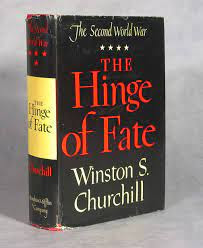My review of Winston
Churchill’s The Hinge of Fate (1950)
Part IV of Winston
Churchill’s World War II memoirs
(Rating 3 of 5)
The
third book in Sir Winston Churchill’s World
War II memoirs covers the year 1942 and most of 1943. At this point the Grand Alliance was formed
the United States of America, the Soviet Union, and Great Britain were
combining their strengths to bring down the regime of the Axis leaders Adolf
Hitler and Benito Mussolini. Also on the
Pacific the American and Royal Navies are waging war against the Japanese
Empire.
Most of
this book consists of is Churchill’s communications between his allies
President Roosevelt and Premier Stalin, as well as numerous communications back
and forth between him and his subordinates.
The book is a middle chapter with neither a real beginning nor real
end. Churchill mostly discusses the
military campaigns in Africa, pressure from the Soviets for a second front in
Europe, sea battles with the Japanese, and some internal political struggle
within Great Britain itself. There are points where the book focus not on the
main events at the time but on plans and discussions for what is about to
come. This can be especially dark when
reading about the discussions on weapons research.
“I told the President in general terms of the great progress we had made, and that our scientists were now definitely convinced that results might be reached before the end of the present war. He said his people were getting along too, but no one could tell whether anything practical would emerge till a full-scale experiment had been made. We knew what efforts the Germans were making to procure supplies of ‘heavy water’—a sinister term, eerie, unnatural, which began to creep into our secret papers. What if the enemy should get an atomic bomb before we did! However skeptical one might feel about the assertions of scientists, much dispute among themselves and expressed in jargon incomprehensible to laymen, we could not run the mortal risk of being outstripped in this awful sphere.” (p. 380)
Julius
Caesar may have a mocked his defeated rivals for making plans about what they
were going to do when they came to power after his defeat, but in actuality is
actually smart to make plans for what is to come after the conflict. It is how you win the peace after you have
won the war. Amongst the allies there
was a good deal of talk about what the postwar world was going to look like
especially in Europe.
“In the course of a general talk I said that the first preoccupation must be to prevent further aggression in the future by Germany or Japan. To this and I contemplated an association of the United States, Great Britain, and Russia. If the United States wish to include China in association with the other three, I was perfectly willing that this should be done; but, however great the importance of China, she was knocked comparable to the others. On these Powers would rest the real responsibility for peace. They together, with certain other Powers, to form a Supreme World Council.” (p.802)
FDR, Churchill, and Stalin
At times during these discussions
the future of a defeated Germany did not look very good for the Germans. Germany, having only been unified since the
Franco-Prussian war of the 1870s, was not naturally viewed by either Churchill
or Stalin as being necessary to continue as a unified state. We know now that Germany would spend over
four decades split apart. However the
division between East and West Germany could have been far worse.
“I said that I would like to see Prussia divided from the rest of Germany, forty million Prussians being a manageable European unit. Many people wish to carry the process of division further and divide Prussia itself into component parts, but on this I reserve judgment. Poland and Czechoslovakia should stand together and friendly relations with Russia. This left the Scandinavian countries and Turkey, which last might or might not be willing, with Greece, to play some part in the Balkan system.” (p.803)
Let's undo this!
Some of the things I enjoyed about
this book happen not to be the great events that we already know happened but
some of the smaller ones. For example, Churchill citing from memory American
poetry from the US Civil War and impressing his audience. More practically I love Churchill’s comments
about when traveling across time zones biplane they should keep their eating
routines identical to the time zone where they first got on the plane in order
not to create confusion.
Having finished this book we are
now two thirds of the way to completion of this entire series. Although I
enjoyed his earlier books I am really more excited for the coming chapters as
we come to the fall of Hitler and the rise of the United Nations.













No comments:
Post a Comment
Please feel free to leave a comment on any article at anytime, regardless how long ago I posted it. I will most likely respond.